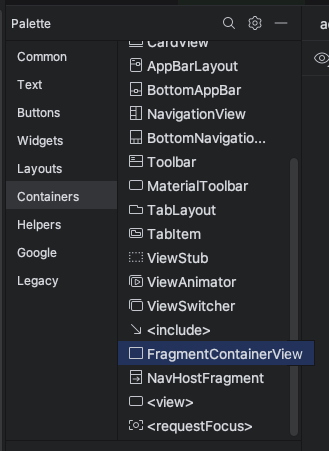Fragment ViewBinding
Fragment viewbinding步驟
建立xml
先在 res/layout/ 目錄下,建立一個fragment_my.xml
1
2
3
4
5
6
7
8
9
10
11
12
13
14
15
16
<?xml version="1.0" encoding="utf-8"?>
<androidx.constraintlayout.widget.ConstraintLayout xmlns:android="http://schemas.android.com/apk/res/android"
xmlns:app="http://schemas.android.com/apk/res-auto"
xmlns:tools="http://schemas.android.com/tools"
android:layout_width="match_parent"
android:layout_height="match_parent">
<TextView
android:id="@+id/name_tv"
android:layout_width="wrap_content"
android:layout_height="wrap_content"
android:text="TextView"
app:layout_constraintEnd_toEndOf="parent"
app:layout_constraintStart_toStartOf="parent"
app:layout_constraintTop_toTopOf="parent" />
</androidx.constraintlayout.widget.ConstraintLayout>
自動產生
app下的build.gradle設置以下內容
1
2
3
4
5
6
7
android {
...
buildFeatures {
viewBinding = true
}
}
Build > CleanProject
MAC是 Build > Compile All Sources
接著會自動產生 FragmentMyBinding
這個類是根據你的 XML 佈局檔案名稱自動生成的:
| 你的 XML 檔案 | 自動生成的 Binding 類 |
|---|---|
| fragment_my.xml | FragmentMyBinding |
| fragment_home.xml | FragmentHomeBinding |
| fragment_profile.xml | FragmentProfileBinding |
命名規則:
移除底線 _
每個單字首字母大寫
結尾加上 Binding
Fragment View Binding
會自動產生 FragmentMyBinding
import com.example.coroutine.databinding.FragmentMyBinding
使用延遲初始化
1
private lateinit var binding: FragmentMyBinding
初始化binding。
傳回binding的xml第一個元素root。
1
2
binding = FragmentMyBinding.inflate(layoutInflater)
return binding.root
Binding程式碼
1
2
3
4
5
6
7
8
9
10
11
12
13
14
15
16
17
18
import android.os.Bundle
import android.view.LayoutInflater
import android.view.View
import android.view.ViewGroup
import androidx.fragment.app.Fragment
import com.example.coroutine.databinding.FragmentMyBinding
class FragA: Fragment() {
private lateinit var binding: FragmentMyBinding
override fun onCreateView(
inflater: LayoutInflater,
container: ViewGroup?,
savedInstanceState: Bundle?
): View? {
binding = FragmentMyBinding.inflate(layoutInflater)
return binding.root
}
}
onViewCreated()使用Binding。
1
2
3
4
5
6
7
8
9
10
11
12
13
14
15
16
class FragA: Fragment() {
private lateinit var binding: FragmentMyBinding
override fun onCreateView(
inflater: LayoutInflater,
container: ViewGroup?,
savedInstanceState: Bundle?
): View? {
binding = FragmentMyBinding.inflate(layoutInflater)
return binding.root
}
override fun onViewCreated(view: View, savedInstanceState: Bundle?) {
super.onViewCreated(view, savedInstanceState)
binding.nameTv.text = "Hello world"
}
}
Activity使用Fragment
使用FragmentContainerView

activity_main2.xml
1
2
3
4
5
6
7
8
9
10
11
12
13
14
15
16
17
18
19
20
21
22
23
24
25
26
27
<androidx.constraintlayout.widget.ConstraintLayout xmlns:android="http://schemas.android.com/apk/res/android"
xmlns:app="http://schemas.android.com/apk/res-auto"
xmlns:tools="http://schemas.android.com/tools"
android:layout_width="match_parent"
android:layout_height="match_parent">
<TextView
android:id="@+id/textView2"
android:layout_width="wrap_content"
android:layout_height="wrap_content"
android:layout_marginTop="4dp"
android:text="TextView"
app:layout_constraintEnd_toEndOf="parent"
app:layout_constraintHorizontal_bias="0.52"
app:layout_constraintStart_toStartOf="parent"
app:layout_constraintTop_toTopOf="parent" />
<androidx.fragment.app.FragmentContainerView
android:id="@+id/fragmentContainerView3"
android:name="com.example.coroutine.fragment.FragA"
android:layout_width="wrap_content"
android:layout_height="wrap_content"
app:layout_constraintBottom_toBottomOf="parent"
app:layout_constraintEnd_toEndOf="parent"
app:layout_constraintStart_toStartOf="parent"
app:layout_constraintTop_toBottomOf="@+id/textView2" />
</androidx.constraintlayout.widget.ConstraintLayout>
binding 檔案
activity_main2.xml會產生 ActivityMain2Binding 類別
1
2
3
4
5
6
7
8
9
10
11
12
13
14
import android.os.Bundle
import androidx.appcompat.app.AppCompatActivity
import com.example.coroutine.databinding.ActivityMain2Binding
class MainActivity14 : AppCompatActivity() {
private lateinit var binding : ActivityMain2Binding
override fun onCreate(savedInstanceState: Bundle?) {
super.onCreate(savedInstanceState)
binding = ActivityMain2Binding.inflate(layoutInflater)
setContentView(binding.root)
val textv = binding.textView2
}
}